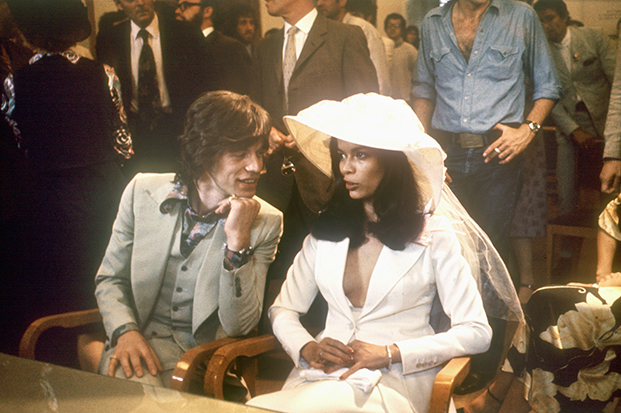It’s the only thing Bianca Jagger and I have in common: we’ve both been victims of false memory. You almost certainly have, too. False memory is the meanest trick your brain can play on you. Instead of refusing to admit that it can’t recall something, the treacherous little creep supplies a wrong answer instead. It’s a phenomenon I’ve been reminded of by two new books.
We wouldn’t mind if our brain fessed up, if it said ‘Sorry boss, can’t help you on that one.’ Simple failures of memory, where you know you can’t remember something, are common. But false memory is your brain going out of its way to provide you with incorrect information. It gives you a recollection of something wrong, after which you base the rest of your thinking on the assumption that it’s right. This can lead to all sorts of trouble.
Jagger’s example first. Her wedding to Mick took place in St Tropez on 12 May 1971. The whole day is a cloud of contradictory testimony. For a start, three people, one of them Keith Richards, claim to have been best man. Fair enough, that’s what you’d expect from rock stars. But Bianca’s mistake is harder to explain. On her wedding night, she claims, Keith Moon abseiled into her bedroom, naked except for the women’s knickers on his head and one of those joke pairs of glasses where the eyeballs go in and out on springs. All very lovely — except that, as David Hepworth explains in Never a Dull Moment, his meticulously researched account of 1971 in rock music, Moon wasn’t at the wedding. He was on his way to a Who gig in Birmingham. He may have appeared before her in such garb on another occasion. But it didn’t happen at the Jaggers’ wedding. Several books now list him as being there — all of them, it would seem, based on Bianca’s mistake.
If your job depends on accuracy, false memory is The Enemy. For years I carried around, and would deploy in conversation, the treasured ‘fact’ that Sophia Loren had once been addicted to peanuts. So severe was her craving, indeed, that she had been forced to seek professional help. This was fun to mention whenever Loren’s name cropped up. But when I came to include it in a book, it seemed only proper to research the full story. Google drew a blank. Emails to Loren’s representatives solicited a predictable response (i.e. none). The author of the most authoritative biography of the actress had never heard the peanuts thing. Clearly I had imagined it. Or transposed it from someone else.
These things are easier to check nowadays, when Ctrl-F can scan millions of words in an instant. Those of us old enough to remember researching in the pre-internet era will know the frustration of searching for a story in a newspaper, swearing blind we’d read it on a left-hand page only to discover it on the right. But still there is no accounting for what that stuff between our ears can get up to. It’s particularly scary when two people’s false memories come together. Wanting to refer in an article to Joseph Goebbels’s dictum that ‘You can always tell a cruel man — he cries in the cinema’, I checked with Matthew Parris, who I remembered using the quote in one of his Times columns. ‘I didn’t say it was Goebbels,’ replied Matthew. ‘I said it was Graham Greene.’ A check in the Times proved him right. But I could find no record of Greene saying it. Back to Matthew, who appealed for help in his next Times column: could his readers solve the mystery? They could — the quote is by Holden Caulfield in The Catcher in the Rye, and runs: ‘You take somebody that cries their goddam eyes out over phony stuff in the movies, and nine times out of ten they’re mean bastards at heart.’ So in a false memory relay, Matthew and I had hopped from a character in an American novel to Hitler’s propaganda chief.
Why do our brains do this to us? The neuroscientist Dean Burnett tackles the issue in his book The Idiot Brain. It’s all to do with ‘activation’, he says. ‘The human memory system is far more malleable than most people would assume. Every activation of a memory — in other words every time we recall it — can lead to it being tweaked.’
Ponder all this for a while and you’ll realise how serious the implications are. They reach way beyond Keith Moon and peanuts. They cast doubt on the extent to which eyewitnesses can be trusted, and therefore how much faith we should place in history books, even in the criminal justice system. As Marcel Proust put it, ‘Remembrance of things past is not necessarily the remembrance of things as they were.’ At least, I think it was him …
Got something to add? Join the discussion and comment below.
Get 10 issues for just $10
Subscribe to The Spectator Australia today for the next 10 magazine issues, plus full online access, for just $10.
You might disagree with half of it, but you’ll enjoy reading all of it. Try your first month for free, then just $2 a week for the remainder of your first year.














Comments
Don't miss out
Join the conversation with other Spectator Australia readers. Subscribe to leave a comment.
SUBSCRIBEAlready a subscriber? Log in